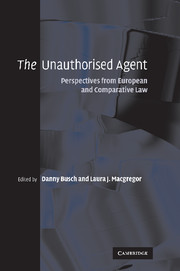Book contents
- Frontmatter
- Contents
- List of contributors
- Foreword
- Preface
- Abbreviations
- Table of cases
- 1 Introduction
- PART 1 The civilian legal systems
- PART 2 The common law
- PART 3 Mixed legal systems
- PART 4 International ‘codes’
- PART 5 Conclusions
- 13 Comparative law evaluation
- 14 Comparative conclusions
- Bibliography
- Index
14 - Comparative conclusions
Published online by Cambridge University Press: 07 September 2009
- Frontmatter
- Contents
- List of contributors
- Foreword
- Preface
- Abbreviations
- Table of cases
- 1 Introduction
- PART 1 The civilian legal systems
- PART 2 The common law
- PART 3 Mixed legal systems
- PART 4 International ‘codes’
- PART 5 Conclusions
- 13 Comparative law evaluation
- 14 Comparative conclusions
- Bibliography
- Index
Summary
General
In all the legal systems studied the general effect of unauthorised agency is that the principal and third party are neither bound nor entitled under a contract (or other legal act) concluded without (sufficient) authority. This rule protects the autonomy of the principal because it prevents him from being bound and entitled against his will.
Apparent authority
However, the interests of the principal are obviously not the only interests involved. In particular, one must take account of the interests of the third party. In the legal systems studied, the doctrine of apparent authority in particular fulfils the function of achieving a balance between the legitimate interests of the principal and those of the third party. Apparent authority allows the third party to sue the principal notwithstanding the fact that the agent was unauthorised.
The various concepts of apparent authority found in the legal systems contain a high degree of similarity. A common characteristic is the giving of validity to appearances, and the protection of the third party who relies, in good faith, on such appearances. Another common factor is the visible tension between the desire to impose liability on the principal only where the erroneous impression of authority was created by him, through his actions, and a recognition that liability must extend wider in order to achieve the ultimate goal of third party protection. As yet, no legal system appears to have rejected the connection with the principal's conduct entirely.
- Type
- Chapter
- Information
- The Unauthorised AgentPerspectives from European and Comparative Law, pp. 439 - 448Publisher: Cambridge University PressPrint publication year: 2009

